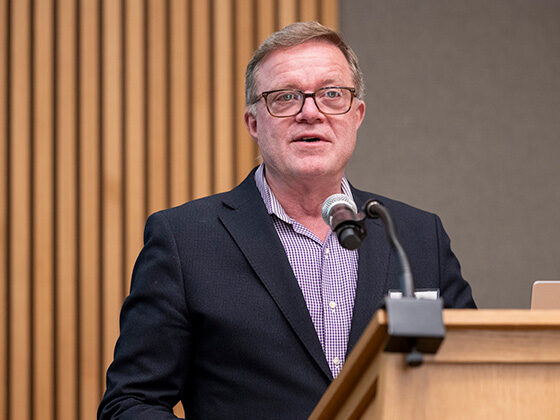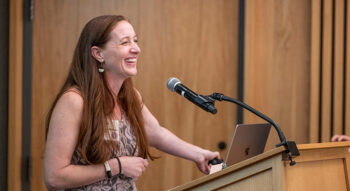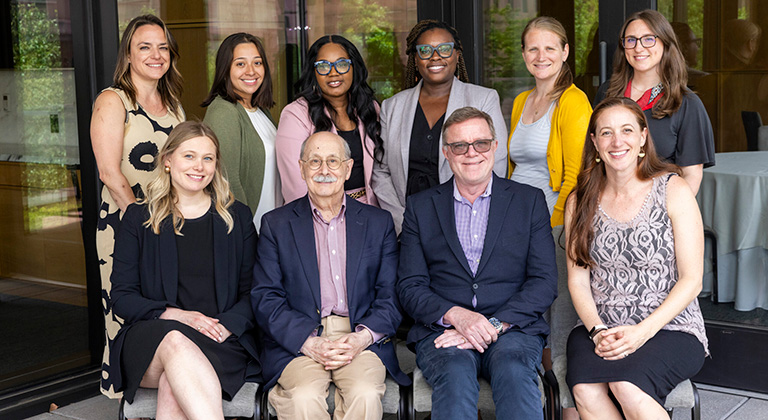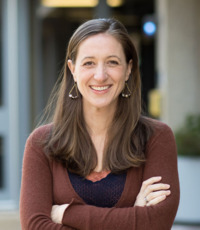News Details
Improving lives through data: SP2’s Actionable Intelligence for Social Policy boosts national impact through students and alumni

Authored by: Juliana Rosati
Photography by: Greg Benson Photography
Faculty & Research, Student Life, Alumni
02/07/25
Like a number of students and alumni of Penn’s School of Social Policy & Practice (SP2), Sharon Zanti, PhD in Social Welfare ’24, has taken a path that is interwoven with SP2’s Actionable Intelligence for Social Policy (AISP) and its national leadership in responsible, collaborative use of data to improve lives.
An initiative co-founded by Professor Dennis Culhane and based at SP2, AISP has paved the way since 2008 for state and local governments to better support residents by responsibly connecting data across multiple dimensions of people’s lives. Zanti saw firsthand the need for such work when she worked as a research fellow and data analyst at the Colorado Department of Human Services prior to enrolling at SP2.
“Questions that seemed simple on the surface, and for which administrative data existed, couldn’t be answered at the time, because we didn’t have the proper data governance processes in place to enable data sharing,” says Dr. Zanti. “For instance, how likely are young people who age out of foster care to experience homelessness?”
In governmental contexts, data have typically remained separate, so that information about an individual’s experience with one service system is not connected to their engagement with other services.
“Data are often held in institutional silos, but the people represented in administrative data often interact with numerous systems,” Zanti says. “We need legal, ethical pathways to share and integrate data across health and human service agencies if we want to make better social policies.”



The opportunity to undertake interdisciplinary doctoral research with Professor Culhane, the Dana and Andrew Stone Chair in Social Policy, drew Zanti to SP2. “There was really no other place in the country where I could study data in this way from a social welfare lens,” she says. Today, she is one of the first people in the country with a PhD focused on the study of integrated data systems for social policy.
Over the years, AISP has grown from its roots collaborating with the City of Philadelphia to a network of 44 state and local governments — sites that cover more than 50 percent of the United States population.
“I am incredibly proud of the very many ways in which AISP improves lives through its vast network and robust training and resources for practitioners, policymakers, researchers, and community partners across the nation,” says SP2 Dean Sara S. Bachman. “From pre-kindergarten access, to COVID-19 relief, to drug overdose prevention, AISP’s support of data-driven problem-solving is integral to the School’s aim of advancing more effective, efficient, and humane human services. In addition, the practical knowledge that students have gained through their engagement with AISP equips them to be leaders in this work for decades to come.”
Growing a national reach from Philadelphia roots
A leading expert on homelessness who is regularly quoted in national media, Dr. Culhane began studying linked administrative data to uncover the patterns of homelessness and the ways in which people in shelters would interact with health and incarceration systems. His research has quantified the costs of homelessness as well as the efficacy of housing interventions and their associated cost reductions.
In 2000, he undertook a pioneering collaboration with the City of Philadelphia and Dr. John Fantuzzo, the Albert M. Greenfield Emeritus Professor of Human Relations at Penn’s Graduate School of Education (GSE). The two faculty worked with the City to create KIDS, one of the nation’s first integrated data systems, establishing best practices for overcoming legal and operational challenges while vigilantly protecting privacy. Later, with support from the John D. and Catherine T. MacArthur Foundation, Culhane and Fantuzzo became co-founders and faculty directors of AISP, connecting a network of state and local data systems and the people who run them — practitioners, policymakers, researchers, and community partners.
Like AISP’s reach, the scope of the issues addressed by its member sites is broad. In Philadelphia, AISP collaborated with Mayor Jim Kenney’s administration to guide expanded access to pre-kindergarten through the City’s integrated data system, now known as IDEA. Because research has shown that the benefits of early-childhood education can help to offset risks to children’s well-being, a team led by Fantuzzo and GSE graduate Dr. Katie Barghaus, used data from multiple agencies to pinpoint locations where children lacked access to quality pre-kindergarten programs and simultaneously faced risks like homelessness and low birth weight. This allowed the City to allocate the available funds to the places of highest need.
“Now more than ever, robust state and local data are essential. In the coming years, integrated data will be at the forefront of social policy analysis and research across health, homelessness, and education.” — Dennis Culhane
More recently, IDEA was used during the COVID-19 pandemic to connect eligible Philadelphia residents with support — relief payments, affordable connectivity, water discounts, and protection from water shutoff. It was also used to implement a pilot transit program that distributed more than 15,500 fully subsidized SEPTA passes to low-income residents.
Case studies from integrated data systems across AISP’s network show success in a variety of areas. A few highlights include improved mental health service delivery in rural South Carolina, better estimates of homelessness costs in Los Angeles County, California, and an effective statewide COVID-19 response that produced nationally significant research in Indiana. In Rhode Island, an initiative to reduce drug-related deaths led the state to become the first in the nation to approve safe drug consumption sites as a measure to prevent overdoses.
Over the years, AISP has grown with significant grant support. In addition to the MacArthur Foundation, its funders have included the Administration for Children and Families, the Department of Housing and Urban Development, the Corporation for National and Community Service, the Robert Wood Johnson Foundation, the Annie E. Casey Foundation, and the Bill & Melinda Gates Foundation. Culhane now serves as faculty director and Fantuzzo as an emeritus.
From Culhane’s point of view, the impact of integrated data has only begun. “Now more than ever, robust state and local data are essential. In the coming years, integrated data will be at the forefront of social policy analysis and research across health, homelessness, and education.”



Propelling student trajectories in social justice
During Zanti’s five years as a PhD student, she worked as a member of AISP’s team in a doctoral fellow position. She now works at a site in the AISP network, Iowa’s Integrated Data System for Decision-Making, as a postdoctoral research associate. “We conduct analyses, build data tools, and improve data processes so that those in the field can better leverage their data to support young children and their families across the state,” she says.
Zanti works under GSE graduate Dr. Heather Rouse, who directs the system for Iowa State University. Several other Penn alumni who trained under Fantuzzo are also leaders in this field, including Dr. Whitney LeBouef, who directs the Linked Information Network of Colorado at the University of Denver; Dr. Rebecca Bulotsky Shearer, who oversees the IDEAS Consortium at the University of Miami; and Dr. Cassandra Henderson, who serves as director of research, analytics, and evaluation for IDEA in Philadelphia.
“Part of what makes us different is a real orientation to leading with the human experience and the people behind the numbers.” — Della Jenkins
In addition to doctoral students, AISP regularly engages with SP2 master’s students as a practicum and internship site for the School’s Master of Social Work (MSW) and Master of Science in Social Policy (MSSP) programs. Emily Berkowitz, MSW’20, MSSP’20, spent six years on the team, first as an intern and most recently as assistant director of communications and engagement.
“Thinking about policy solutions in a holistic way was a common theme between my coursework and AISP,” says Berkowitz. “Every time I wrote a paper, I couldn’t focus on just child welfare or just housing. I had to ask, ‘What is this broader ecosystem where all of these services exist?’”
While Berkowitz recently moved on to continue her impact on state government in a communications and outreach role with Pennsylvania State Senator Nikil Saval, a number of AISP’s current staff members are SP2 alumni. These include Assistant Director of Training and Technical Assistance Isabel Algrant, MSSP+DA’24, Associate Director TC Burnett, MSW’17, Senior Coordinator Kristen Egoville, MSW’15, Administrative Coordinator Jessie Rios Benitez, MSSP’24, and Executive Director Della Jenkins, MSSP’13. In addition, MSW student Liv Barry is a current intern.
According to Jenkins, SP2 students’ commitment to effecting change in the world makes them a strong match for AISP’s mission. “SP2 attracts students who are not just interested in a social work degree or a public policy degree, but are really coming in with a frame of social justice,” she says. “There are a lot of organizations working with data, analytics, data science, IT systems, and even building public interest technology. Part of what makes us different is a real orientation to leading with the human experience and the people behind the numbers.”

The AISP team, pictured in June 2023
Advancing applied data ethics, law, and the social good
For AISP, focusing on the human experience means seeking to balance the risks and benefits of data. Before becoming AISP’s newest team member, Algrant explored these issues in an SP2 course taught by Dr. Amy Hawn Nelson, AISP’s director of training and technical assistance and a research faculty member.
“Her class opened my eyes to the possibilities of using integrated data for the social good, but it also highlighted the potential dangers and why certain communities have every right to be skeptical of it,” Algrant says of her time in the course, which is called Applied Data Ethics, Law, and the Social Good. According to Hawn Nelson, skepticism is a core theme of the course.
“I very intentionally introduce cognitive dissonance — that data is not always the best way, that more data does not equal more insights, or better policy,” says Hawn Nelson, who previously directed an integrated data system in Charlotte, North Carolina, and is currently principal investigator of much of AISP’s grant-funded research. When it comes to decisions about which data to collect and how to share it, she says, “There’s a tension in those decisions, and they have to be made collaboratively and collectively.”
After graduating from SP2’s Master of Science in Social Policy Program + Data Analytics for Social Policy Certificate and teaching middle school, Algrant joined the AISP team. She now works with Hawn Nelson to provide training and problem-solving for the network. “With AISP, I have gotten the opportunity to use what I have learned to support positive data use with the appropriate safeguards,” Algrant says.
Assistant Director of Training and Technical Assistance Isabel Algrant, MSSP+DA’24, is AISP’s newest team member.

Ensuring that appropriate safeguards are in place is a core focus of AISP’s work. “Safe, trusted data are particularly important in this moment,” says Jenkins. “As a community, our network is working hard to ensure that data governance at the state and local level protects privacy and builds public trust.”
Originally an elective for graduate and professional students, Applied Data Ethics, Law, and the Social Good is now also the foundation of a new certificate program by the same name. Hawn Nelson built the course’s curriculum around a number of publications written by the AISP team and housed in its resource library. Guest speakers include network and team members, among them AISP Director of Legal Policy Deja Kemp.
“My passion is demystifying the law for non-lawyers through engaging and interactive legal trainings,” says Kemp, who shares insight from her experience providing legal guidance to AISP’s network and previously to a North Carolina school district. “I hope that students will take away an appreciation of how complex the current regulatory landscape is.”
Nine Penn students — five from SP2, three from the Fels Institute of Government, and one from the Perelman School of Medicine — have completed the certificate program since its recent launch. “The certificate has been immediately applicable to my career in public health capacity building,” says Olivia Beres, a certificate recipient in SP2’s Master of Science in Nonprofit Leadership Program who works as a data systems manager for a global health care and social services organization.
Just as AISP integrates data across agencies, the course connects the next generation of professionals at SP2 and Penn across programs and fields. “It’s getting the bioethics student and the social worker and the analytics person to talk to one another, to lift up different issues,” Hawn Nelson says. “The multidisciplinary nature of the class is really the magic.”
People
-

Dennis P. Culhane, PhD
Professor
Contact
office: 215.746.3245
fax: 215.573.2099
Email
-

Della Jenkins, MSSP
Executive Director, Actionable Intelligence for Social Policy
Contact
Email
-

-

Deja D. Kemp, JD
Director of Legal Policy, Actionable Intelligence for Social Policy
Contact
office: 215.573.5827
Email